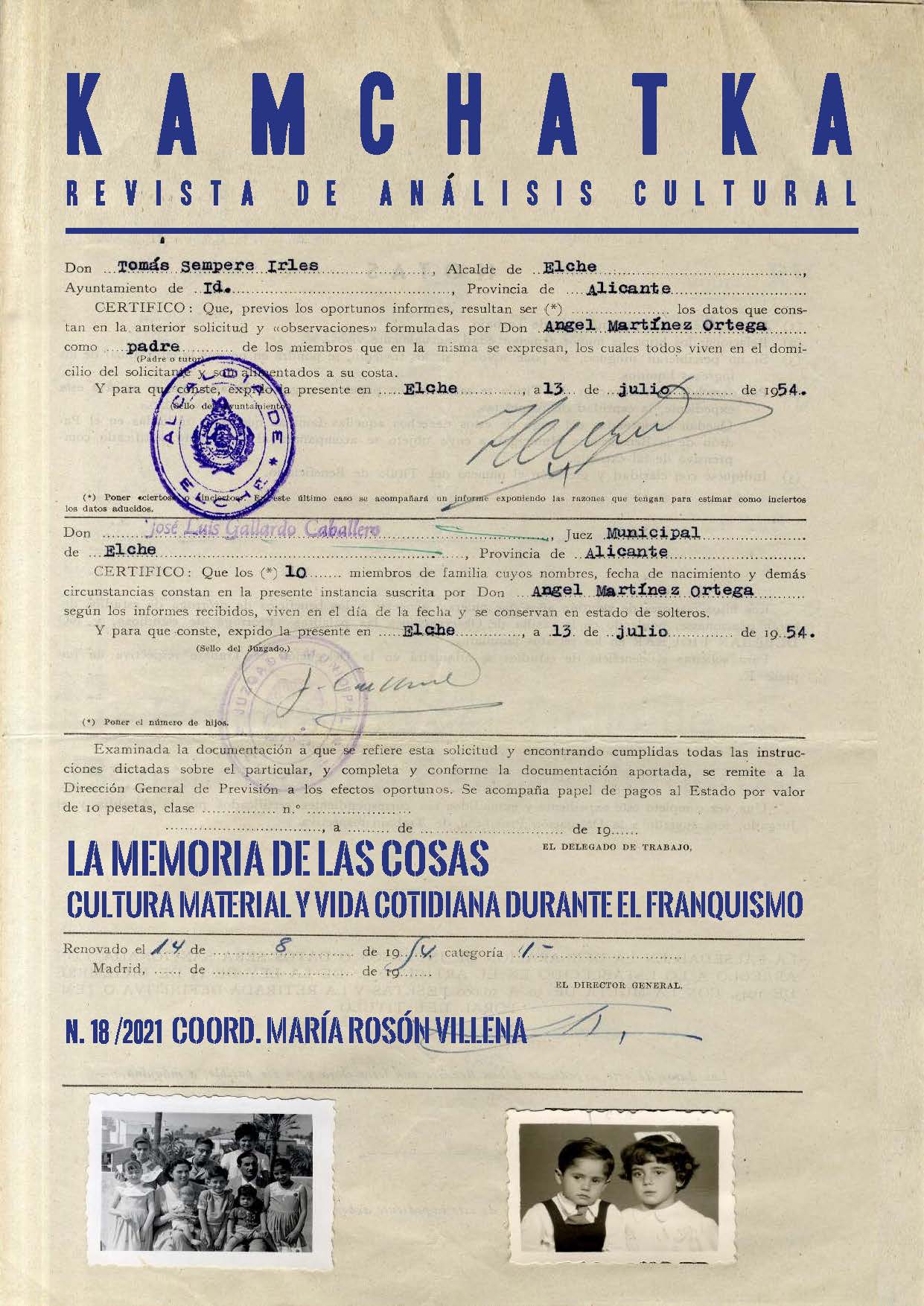Transgenerational Transmission of Memory of Francoism: The Home Movie as Document in Making Memory (2005) by Sandra Ruesga
DOI:
https://doi.org/10.7203/KAM.18.18515Keywords:
francoist monuments, home movie, postmemory, performative documentary, materiality and affects Abstract
Abstract
In the documentary short film Making Memory, Sandra Ruesga edits fragments of the home movies that her parents recorded from the transition period to the nineties along with current telephonic conversations between her and her parents. The innocent record of family visits to Francoist monumental spaces changes its reception context when it is recycled by the generation of postmemory to make a microhistorical chronicle in the performative documentary. My aim in this article is to inquire into the construction of memory around the Francoist monuments in private home movies that are transformed into a document when they become public. To that purpose, I focus on the strategies to rise the forgetting of the past and whitewash the dictatorship materialized in the original videos that Ruesga appropriates. Likewise, I draw on theories of postmemory, performative documentary and material culture to analyze the recontextualization of the family archive as a medium of transgenerational transmission of memory.
 Downloads
Downloads
 References
References
Barrero, Juan, Ruesga, Sandra, Urquiza, Elia, Cuevas, Raúl, López, Guillén, y Rovira, Mònica (2005). Entre el dictador i jo. España: Estudi Playtime.
Bartolomé, Cecilia y Bartolomé, José Juan (1981). Después de… (No se os puede dejar solos). España: Producciones Cinematográficas Ales S.A.
Camper, Fred. “Notes on Home Movies”. Journal of Film and Video 38 (1986): 9-14.
Cendros, Teresa. “Pero ¿quién era Franco? Seis cineastas nacidos a partir de 1975 filman el desconcierto de su generación ante el dictador”. ElPaís (2005).
Cuevas Álvarez, Efrén. “Home Movies as Personal Archives in Autobiographical Documentaries”. Studies in Documentary Film 7 (2013): 17-29. DOI: 10.1386/sdf.7.1.17_1
Cuevas Álvarez, Efrén (2010). “De vuelta a casa. Variaciones del documental realizado con cine doméstico”. Cuevas Álvarez, Efrén (ed.). La casa abierta. El cine doméstico y sus reciclajes contemporáneos. Madrid: Ocho y Medio: 121-166.
Cuevas Álvarez, Efrén. “Microhistorias fílmicas: el cine doméstico en el documental contemporáneo”. Secuencias: revista de historia del cine 25 (2007): 7-24.
Faber, Sebastiaan (2018). Memory Battles of the Spanish Civil War: History, Fiction, Photography. Nashville: Vanderbilt UP.
Graham, Helen (2018). Breve historia de la guerra civil [Digital ePub]. Titivillus.
Graham, Helen y Labanyi, Jo (1995). “Culture and Modernity: The Case of Spain”. Graham, Helen y Labanyi, Jo (eds.). Spanish Cultural Studies. An Introduction. The Struggle for Modernity. Oxford y New York: Oxford University Press: 1-19.
Hirsch, Marianne (2015). La generación de la posmemoria. Escritura y cultura visual después del Holocausto. Madrid: Carpe Noctem, PanCritica.
Kuhn, Annette (2002). Family Secrets. Acts of Memory and Imagination. London y New York: Verso.
Marks, Laura (2002). Touch. Sensuous Theory and Multisensory Media. Minneapolis, MN: University of Minnesota Press.
Marks, Laura (2000). The Skin of the Film: Intercultural Cinema, Embodiment, and the Senses. Durham: Duke UP.
Martín Patino, Basilio (1974). Caudillo. España: Retasa.
Marton, Andrew (1964). El Valle de los Caídos (The Valley of the Fallen). España: Samuel Bronston Productions.
Nichols, Bill (2001). Introduction to Documentary. Blomington: Indiana University Press.
Nichols, Bill (1994). Blurred Boundaries. Questions of Meaning in Contemporary Culture. Bloominton and Indianapolis: Indiana University Press.
Odin, Roger (2008). “El film familiar como documento. Enfoque semiopragmático”. Català, Josep M y Cerdán, Josetxo (eds.). Después de lo real (vols. I y II). Valencia: Archivos de la Filmoteca, IVAC, 58: 197-217.
Portela, Edurne. “Memory and Postmemory in Lidia Falcón’s Play Las mujeres caminaron con el fuego del siglo”. Hispania 96 (2007): 515-524. DOI: 10.1353/hpn.2013.0069
Preston, Paul. 2004. Palomas de Guerra. Cinco mujeres marcadas por el enfrentamiento bélico. Madrid: DeBolsillo.
Quílez Esteve, Laia. “Memorias protésicas: Posmemoria y cine documental en la España contemporánea”. Historia y Comunicación Social 18 (2013): 387-398. https://doi.org/10.5209/rev_HICS.2013.v18.43974
Quílez, Laia y Rueda Laffond, José Carlos (eds.) (2017). Posmemoria de la Guerra Civil y el Franquismo. Narrativas audiovisuales y producciones culturales en el siglo XXI. Granada: Comares, Colección Constelaciones.
Ramblado Minero, María Cinta. “Sites of Memory / Sites of Oblivion in Contemporary Spain”. Revista Canadiense de Estudios Hispánicos 36 (1) (2011): 29-42.
Ribeiro de Menezes, Alison. “Family Memories, Postmemory, and the Rupture of Tradition in Josefina Aldecoa’s Civil War Trilogy”. Hispanic Research Journal 13:3 (2012): 250-263. DOI: 10.1179/1468273712Z.00000000014
Renov, Michael (1999). “Domestic Ethnography and the Construction of the ‘Other’ Self”. Gaines, Jane y Renov, Michael (eds.). Collecting Visible Evidence. Minneapolis: University of Minnesota Press: 140-155.
Rodríguez Barreira, Óscar (2018). “La dictadura franquista: 1939-1975”. Álvarez Junco, José y Shubert, Adrián (eds.). Nueva historia de la España contemporánea (1808-2018). Barcelona: Galaxia Gutenberg: 183-209.
Ryan, Lorraine. “A Reconfigured Cultural Memory and the Resolution of Post-Memory in Alfons Cervera’s Aquel invierno”. Hispanic Research Journal 11:4 (2010): 323-337. DOI: 10.1179/174582010X12753886893354
Sarlo, Beatriz (2006). Tiempo pasado. Cultura de la memoria y giro subjetivo. Una discusión. México: Siglo XXI Editores.
Tranche, Rafael R. y Sánchez-Biosca, Vicente (2010). NO-DO. El tiempo y la memoria. Madrid: Cátedra/Filmoteca Española.
Young, James. “The Holocaust as Vicarious Past: Restoring the Voices of Memory to History”. Judaism: A Quarterly Journal of Jewish Life and Thought 51 (2002): 71-87.
Downloads
Published
How to Cite
-
Abstract1205
-
Artículo PDF (Español)726
Issue
Section
License
This journal provides an immediate free access to the content on the principle that freely make investigation available to the public, which promotes an increased global knowledge exchange.
Unless otherwise indicated, texts published in this journal are under the license Attribution-NonComercial 4.0 by Creative Commons. These texts may be copied, distributed and publicly communicated whenever the publication’s author and title are quoted and whenever they are not used for commercial purposes. In any case, intellectual property of the articles and its potential economic rights entirely belong to its authors.
The full license can be consulted on https://creativecommons.org/licenses/by-nc/4.0/. We encourage authors to disseminate papers published in Kamchatka. Journal of cultural analysis electronically, in institutional digital repository or in their websites.





